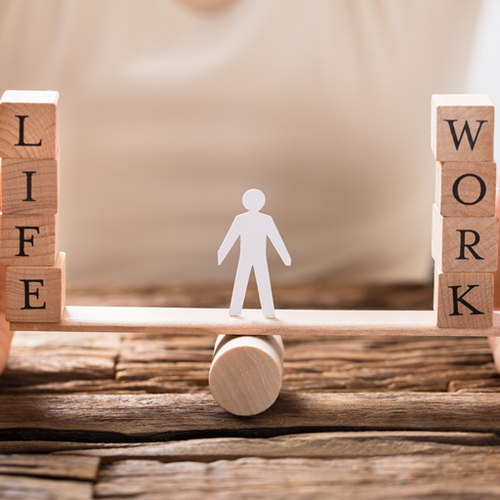Work-life balance is a phrase used to describe an individual's feelings of satisfaction with the participation in job-related activities and his or her personal life. This state is achieved when an individual feels the amount of time spent making money to provide for one's household and advancing career goals is adequately balanced with the amount of time spent in independent and personal pursuits, such as friendships, family, spirituality, hobbies, and leisure activities.
Failure to maintain work-life balance may result in significant emotional distress and reduction of productivity. In many cases, spending more time at work may actually lead to a decrease in productivity. Some individuals feel that their workplace creates too many pressures to maintain a work/life balance, and they may feel a reduction in their feelings of satisfaction and enjoyment of life. Some individuals feel as if there is not enough time for other aspects of life. In general, individuals who work more than 60 hours per week are colloquially called workaholics.
As people born between 1960 and 1980, collectively known as Generation X, entered the workplace, managerial strategies have shifted towards encouraging work/life balance in order to retain highly skilled employees who, as a group, regard workaholism less positively than their predecessors. Multiple studies have found that Americans work significantly more hours than their counterparts in other industrialized nations. In order to retain valuable employees, attract new employees, maximize productivity, improve morale, and decrease career burnout, most contemporary mainstream managerial practices emphasize the importance of work/life balance.
Individuals identified as "workaholics" tend to experience some or all of the following characteristics: perfectionism, image conscious, and impatience. Further, these individuals may consistently make unreasonable demands, experience difficulty in delegating tasks, become easily frustrated with individuals whose first priority is not always work, and base their feelings of self-worth on their work performance. Some workaholics may use their career as a way to escape negative emotions and may have unreasonably high expectations for themselves. Many individuals who have difficulty maintaining a work/life balance may be diagnosed with depression, obsessive-compulsive disorder, and/or anxiety disorders. In addition, these individuals are at a significantly increased risk for what is known as "career burnout," a state of emotional exhaustion, cynicism, and a diminished sense of personal accomplishment that adversely impacts one's career trajectory.
Demographic surveys have shown that employees from Generation X and the Millennials, those born after 1980, regard work/life balance as more important than their predecessors. Individuals referred to as "workaholics" have been the subject of a large amount of recent psychological research.





